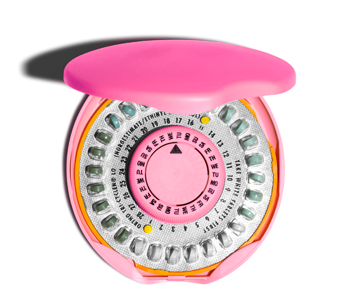
Have you considered going off birth control recently? Perhaps your a wife who don’t want unhealthy hormones in your body or maybe you’re ready to start a family. Whatever your reason for wanting to get off the pill, read the article below for the most common side effects that you can expect. -Taryn Cox for THE WIFE
To begin, the birth control pill works by preventing ovulation. Once you stop taking the pill, the hormones are out of your body quickly, usually within a couple of days (this is why women who miss a couple days of pills on birth control have a chance of ovulating and getting pregnant!). Another important point to make is that it does not matter how long you were on the pill, from 10 weeks to 10 months to more than 15 years, your body will still be rid of the hormones within a couple of days!
Once the hormones are out of your system, your body will begin to start producing hormones to initiate menstrual cycles. Some women will begin to ovulate in a couple of weeks, whereas it may take several months for other women to begin to ovulate. Generally speaking, your body should be back to “normal menstruation mode” within two to three months after stopping the pill. It is important to emphasize that if you had problems with ovulation prior to starting the pill, you may continue to have irregular ovulation/periods after stopping the pill. Most women with normal ovulation/periods prior to starting the pill will continue to have normal ovulation/periods after stopping the pill. But, some women who had regular periods prior to starting the pill may have irregular ovulation after stopping the pill. The key point here is that everyone’s experience with ovulation/periods after stopping the pill is different!
There is a condition called post-pill amenorrhea (or lack of menstruation) that can occur after stopping the birth control pill. According to the Mayo Clinic, the reason for lack of menstruation in these women is that the body is just taking longer to produce the hormones necessary for ovulation and menstruation. If you still haven’t had a period after three months, they recommend taking a pregnancy test. It would be prudent to also schedule an appointment with either your primary care physician or gynecologist for evaluation. Some women never get a period after they stop taking the pill because they ovulate and conceive right away after the discontinuation. If you do not want to become pregnant, use another form of contraception such as condoms or a diaphragm.
Many women take certain birth control pills to regulate their acne. Once you stop using birth control, you may notice an increase in acne on your face or on other parts of your body. When your body’s hormone levels regulate again, the acne can subside in some cases. As far as weight fluctuation is concerned, it has been shown that birth control pills that are higher in estrogen may cause weight gain and water retention. Therefore, your body may adjust after stopping the pill and some weight loss may occur due to a decrease in water retention. Again, each woman’s experience may be different. Many birth control pills are designed especially to help treat exaggerated premenstrual syndromes or in certain women, premenstrual dysphoric disorder. Thus, some women will notice increased breast tenderness and other premenstrual symptoms such as nausea, headaches and fluctuating emotions. -Dr. Sugar for Fitsugar.com








1 comment so far ↓
I’ve always wondered what would happened the day I decided to do this…. Thanks for killing my curiosity
Leave a Comment